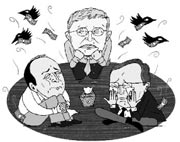IT’S GOING to be a sad Christmas around the Jeff Bezos house. He’s down to his last billion and counting.
Unlike 1,300 of his former employees, Bezos still has a job, as CEO of Amazon. com, even though he’s lost money six years in a row.
But now, in just the past 12 months, the former Time magazine Man of the Year has lost three-quarters of his personal fortune, dropping $3.5 billion due to stock losses and a decelerated economy.
Percentagewise, Craig McCaw, the wealthiest member of the Seattle telecom- pioneering McCaw family, fared only slightly better, losing two-thirds of his worth, a $5 billion tumble.
Still, he’s lucky. The sucking economy and the companion high-tech bust has turned four other local billionaires into mere multimillionaires.
A Seattle Weekly count also found another dozen of the wealthiest Washingtonians have lost more than $40 billion of their personal wealth over the past year, due mainly to the market slide and helped along by the tragedies of Sept. 11.
Their combined losses are equivalent to the $40 billion we’re now paying for the Office of Homeland Security anti- terrorism measures.
That’s also what it would cost to fund Washington state’s budget for four years, or Seattle’s for a half-century.
It’s enough even to build Paul Allen a new stadium in every state in the union plus Puerto Rico.
In other words—if it makes you feel any better as the repo man drives away with your new Yugo—the rich are poorer people, too. Or less rich, anyway.
Of course, stock-based fortunes can rise or fall by millions of dollars overnight. But this year and last, they’ve been mostly falling.
Not surprisingly, most of the region’s personal losses—about $38 billion of the $40 billion—was dropped by the rich techies from the suburban fiefdoms east of Seattle.
The biggest losers were Microsoft co-founders Bill Gates and Allen, who dropped $16 billion and $12 billion, respectively, compared to last year.
For Gates, that’s an average daily loss of over $43 million—in two days, he lost more than what it cost to build his $59 million Lake Washington estate.
If you go back two years, Gates has lost $46 billion altogether—equal to his worth today. In two years, Allen has lost at least $16 billion.
Neither is making reservations on the soup line, however. With diverse portfolios and a comparably steady performance by Microsoft’s stock despite the slump, they remain the first and third richest Americans, according to Forbes magazine (investor Warren Buffet is second).
Microsoft CEO Steve Ballmer lost a $3 billion chunk of his fortune after dropping $6 billion the previous year, while fellow Microsofties Charles Simonyi and Jon Shirley (retired) together dropped a relatively light $165 million.
Among those falling the hardest was RealNetworks CEO Rob Glaser. He took a $1.8 billion personal hit as his company posted millions in losses and its stock hit a one-year low. Similarly, InfoSpace CEO Naveen Jain lost $1.6 billion.
Both tumbled from the current Forbes 400-richest list.
John Stanton, the innovator who sold VoiceStream Wireless to Deutsche Telekom for $29 billion and still eats hamburgers at a local bowling alley, managed nonetheless to lose over $300 million.
The pain was more bearable for those steering clear of cyberspace.
Billionaire Jim Jannard, the founder of Oakley—a maker of sunglasses and accessories—is out just $100 million, while John Edson, founder of boatmaker Bayliner, and Joshua Green III, from the pioneer banking family, each dropped $25 million.
HOW DO the wealthy deal with this financial downturn? Switch from imported to domestic caviar? Opt for a Lexus SC over the BMW roadster? Board up that third mansion in the south of France?
None of the several representatives of the wealthy we contacted would say exactly what a billionaire does to make ends meet—”That’s private,” was the refrain.
But there are a few downmarket indicators.
Cellular phone mogul Craig McCaw, for one, is selling or has sold three jets, three homes, his yacht, a 5,000-acre ranch in Carmel, and his $50 million private island near Victoria where he entertained such Hollywood’s B-listers as Pamela Anderson and Tom Arnold.
The New York Times recently suggested the downsizing was a gilded garage sale intended to raise money to pay off growing debt. But a spokesperson says McCaw was just raising money to spend elsewhere.
Some luxury items were also sold as a result of McCaw’s divorce pact with his former wife, Wendy, now owner of the Santa Barbara News-Press (who has hit the skids herself, losing at least $1.4 billion in the past year).
At the least, Craig McCaw’s sellathon is helping other rich guys get through the tough times.
He sold his Gulfstream V, valued at $38 million, to actor Jim Carrey six months ago and wants to sell a custom, unfinished $54 million Boeing 737 to anyone who can afford it.
McCaw also recently peddled his year-old 300-foot yacht, the Tatoosh, to Paul Allen. It includes a speedboat, swimming pool, gold-leaf interior decorations, and a price tag estimated at $100 million.
OK, so it’s used. We all have to make concessions.








